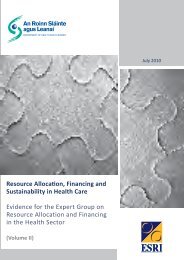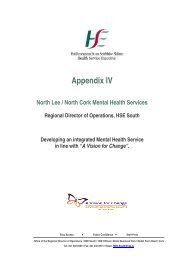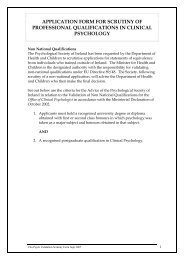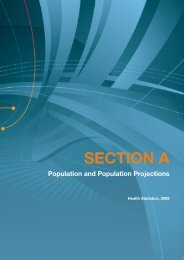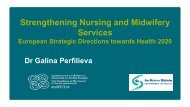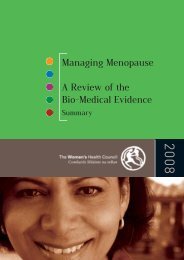Brennan Report - Department of Health and Children
Brennan Report - Department of Health and Children
Brennan Report - Department of Health and Children
Create successful ePaper yourself
Turn your PDF publications into a flip-book with our unique Google optimized e-Paper software.
Chapter 5 Accountability – Hospital <strong>and</strong> Non-Hospital ProgrammesTraining NeedsIn addition to the information technology requirements necessary to give effect to the aboverecommendations (see Chapter 10), it will be necessary to provide a range <strong>of</strong> ongoing training<strong>and</strong> assistance to the main participants in the process to assist in the implementation <strong>of</strong> theabove recommendations.Recommendations on Implementation in the General Hospitals ProgrammeR5.15 Business managers should receive continuous relevant training to ensure they have the requisite skills, training<strong>and</strong> experience in medical <strong>and</strong> clinical work as well as finance <strong>and</strong> management to perform their duties.R5.16 The health board/hospital CEO should be responsible for determining the appropriate level <strong>and</strong> quantum <strong>of</strong>training <strong>and</strong> for putting in place the mechanisms necessary to ensure that training is delivered.R5.17 The Executive should liaise with educators to prepare/train clinical Consultants/Heads <strong>of</strong> <strong>Department</strong> on anongoing basis to underst<strong>and</strong> <strong>and</strong> to work with new financial management information systems.R5.18 The <strong>Department</strong> <strong>of</strong> <strong>Health</strong> <strong>and</strong> <strong>Children</strong> should liaise with the Higher Education Authority to introduce arequirement for medical schools to develop programmes to ensure that every medical student receives at leastone module on health economics, technology assessment <strong>and</strong> financial management <strong>and</strong> control issues.R5.19 A working group under the aegis <strong>of</strong> the Executive, in consultation with the <strong>Department</strong> <strong>of</strong> <strong>Health</strong> <strong>and</strong> <strong>Children</strong>,should examine <strong>and</strong> make recommendations on appropriate incentives for those clinical Consultants/departments that successfully implement recommendations above.Public/Private Mix in Public HospitalsThe existing arrangements for mixing public <strong>and</strong> private treatments are inherentlyunsatisfactory from a management <strong>and</strong> control perspective.They result in a conflict <strong>of</strong> interestfor Consultants between meeting clinical obligations to public patients on the one h<strong>and</strong> <strong>and</strong>, onthe other, the prioritisation, treatment <strong>and</strong> the use <strong>of</strong> publicly provided infrastructure <strong>and</strong>resources in public hospitals for private patients. They also raise issues <strong>of</strong> fair competitionwith private hospitals in that the resources used are not charged for fully. They severely limitthe time the majority <strong>of</strong> clinicians have to pursue resource management. Ultimately, these issuescan only be resolved fully by completely separating public <strong>and</strong> private practices.Table 5.1 <strong>and</strong> Figure 5.1 give some indication <strong>of</strong> the levels <strong>of</strong> subsidy from the taxpayer towardsthe cost <strong>of</strong> treating private patients.71



